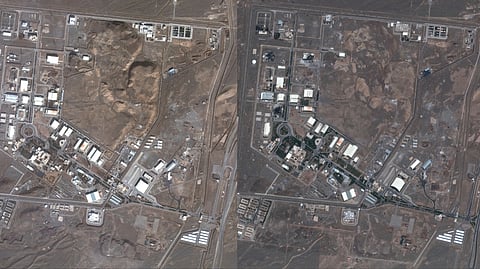

TEL AVIV: Iranian media reported a "massive explosion" on Saturday following an Israeli drone strike on the South Pars refinery in the southern port city of Kangan. It marks the first Israeli attack on Iran's oil and natural gas industry.
"An hour ago, an Israeli drone hit one of the South Pars Phase 14 refineries, causing a massive explosion and fire in the refinery," the Tasnim news agency said, while the Fars agency reported firefighters were working to extinguish a blaze that had erupted as a result of the attack.
Iran shares the gas field, which stretches across the Persian Gulf, with Qatar.
Israeli military late on Saturday said it struck an underground facility in western Iran's Khorramabad that contained surface-to-surface and cruise missiles.
"This is an important site that was even featured in a propaganda video by the Iranian regime in the past," military spokesman Brigadier General Effie Defrin told journalists.
He was likely referring to footage aired by Iran's Revolutionary Guards earlier this year showing what it described as a new underground missile facility.
"It was struck and the senior officials associated with it have also been eliminated," Defrin said, adding that "dozens of other such sites have also been destroyed".
The military said the site contained "storage tunnels for surface-to-surface missiles and cruise missiles as well as multiple launch shafts".
Meanwhile, Iranian media said that top adviser to supreme leader Ayatollah Khamenei died in the hospital a day after Israel launched airstrikes across the country.
Ali Shamkhani had previously served as Iran’s top national security official for a decade and had represented Iran in the China-facilitated rapprochement talks with Saudi Arabia.
Israel's military on Saturday launched fresh attacks on several sites across Iran as it kept up its campaign targeting the Islamic republic's military and nuclear sites.
"We are currently launching attacks on several sites in Iran," military spokesman Brigadier General Effie Defrin said in a televised press conference after Iran responded to Israeli strikes with waves of drones and missile barrages.
Israel’s defense minister warned that “Tehran will burn” if Iran continues firing missiles, as the two countries traded blows a day after Israel launched a blistering surprise attack on Iranian nuclear and military sites, killing a number of top generals.
Israeli Prime Minister Benjamin Netanyahu also threatened to strike "every target of the ayatollah regime" in Iran, adding that Israeli strikes had dealt a "real blow" to Tehran's nuclear programme.
"We will hit every site, every target of the ayatollah regime," Netanyahu said in a video statement on the second day of Israel's air campaign targeting Iranian military and nuclear sites.
"We have dealt a real blow to their nuclear programme" since Friday, he added.
"We have opened a path to Tehran. Very soon, you will see Israeli aircraft -- our air force, our pilots -- in the skies over Tehran," Netanyahu said.
In response, Iranian President Masoud Pezeshkian warned that there would be a "more severe and powerful response" if Israel continued to strike his country.
"The continuation of Zionist aggression will be met with a more severe and powerful response from the Iranian armed forces," Pezeshkian said in a phone call with Pakistani Prime Minister Shehbaz Sharif, according to the Iranian presidency.
Iranian media also said air defences were activated over Tehran and six other provinces.
News agency Tasnim said air defences were responding to "hostile targets" over Tehran and in the provinces of Hormozgan in the country's south, Kermanshah and Lorestan in the west, Qom in the centre, East Azerbaijan in the northwest, and Khuzestan in the southwest. State TV reported air defence activity in the same areas.
Another news agency, Fars, shared images of what it said was the "destruction of two Israeli aircraft in Tehran".
The Israeli military said that its air strikes on Iran had killed more than 20 Iranian army and Revolutionary Guards commanders, including armed forces chief Mohammad Bagheri.
"Since the beginning of the operation (on Friday), over 20 commanders in the Iranian regime's security apparatus have been eliminated," the military said in a statement, naming several top commanders in the Islamic Revolutionary Guard Corps and the armed forces.
Iran’s U.N. ambassador said 78 people were killed and more than 320 wounded in the attacks.
Iran retaliated by launching waves of drones and ballistic missiles at Israel, where explosions lit the night skies over Jerusalem and Tel Aviv and shook buildings.
Speaking after an assessment meeting with the army’s chief of staff, Defense Minister Israel Katz said that Iran will pay a heavy price for harming Israeli citizens.
"If (Iranian Supreme leader Ayatollah Ali) Khamenei continues to fire missiles at the Israeli home front — Tehran will burn,” Katz said.
Prime Minister Benjamin Netanyahu said Friday that his objective was to eliminate any Iranian threat to Israel, but he also urged Iranians to rise up against their leaders. Israel would welcome the government’s overthrow even if it is not actively seeking it.
Strikes could derail nuclear talks
Israel’s strikes also put further talks between the United States and Iran over a nuclear accord into doubt. The U.S. and Iran were scheduled to meet in Oman, on Sunday.
Iran’s top diplomat said Saturday that talks with the United States were “unjustifiable” after Israeli strikes on his country, likely signaling no negotiations this weekend with Washington. However he stopped short of saying the talks were canceled.
The comments by Abbas Araghchi, Iran's minister of foreign affairs, came when he spoke by phone with Kaja Kallas, the European Union’s top diplomat.
The Israeli airstrikes were the “result of the direct support by Washington,” Araghchi said in a statement carried by the state-run IRNA news agency. The U.S. has said it isn’t part of the strikes.